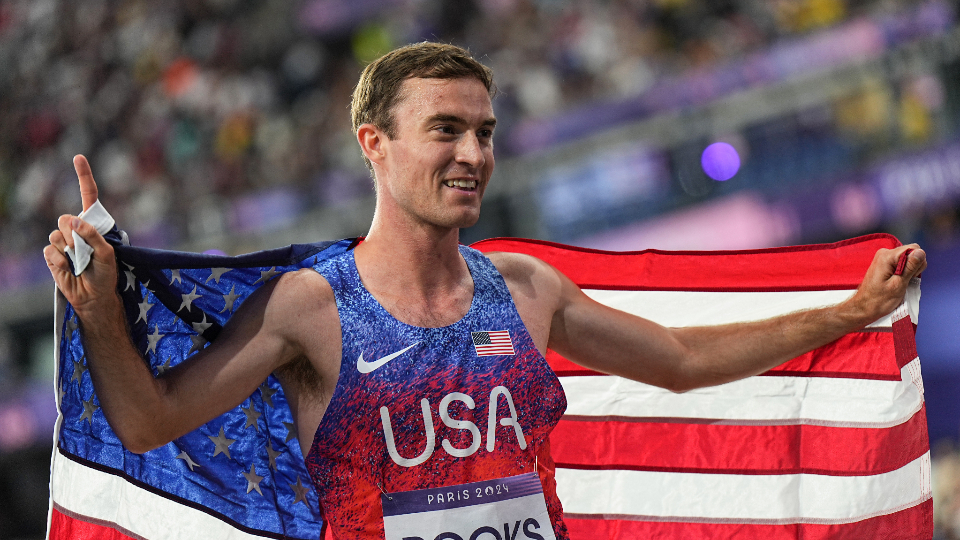
rooks-silver-alma-26-1.jpg
Kenneth Rooks poses after winning the silver medal in the men's 3,000-meter steeplechase final, at the 2024 Summer Olympics, Wednesday, August 7, 2024, in Saint-Denis, France. Photo by Michael Kappeler/picture alliance via Getty Images.All rights reserved.This story appears here courtesy of TheChurchNews.com. It is not for use by other media.
By Trent Toone, Church News
Before running in the men’s 3,000-meter steeplechase prelims of the 2024 Paris Olympics on Monday, August 5, Kenneth Rooks worried he might not be able to compete with the top runners in his event.
The 24-year-old returned Latter-day Saint missionary found comfort and inspiration in the Book of Mormon, specifically Alma chapter 26.
In that chapter, Ammon glories in the Lord. When his brother Aaron rebukes him for boasting, Ammon replies, “I know that I am nothing; as to my strength I am weak; therefore I will not boast of myself, but I will boast of my God, for in his strength I can do all things“ (verse 12).
Rooks said those passages reminded him to be humble and trust in the Lord.
“That didn’t necessarily mean that I was going to win,” the former BYU track star told the Church News in a phone interview from Paris. “But I knew I could access His power if I put my trust in Him. The strength of the Lord is a real thing.”
Rooks not only qualified for the finals, he then surprised the steeplechase world by earning the silver medal on Wednesday, August 7.
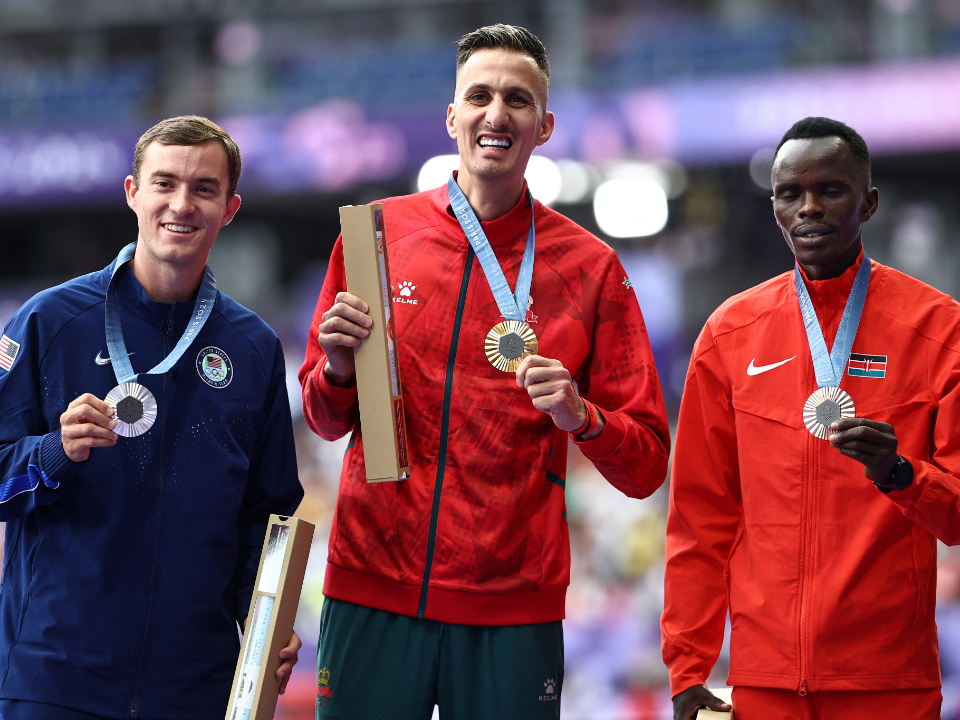
rooks-silver-alma-26-2.jpg
Men's 3,000-meter steeplechase gold medalist Soufiane El Bakkali, center, of Morocco, stands with silver medalist, Kenneth Rooks, left, of the United States, and bronze medalist, Abraham Kibiwot, of Kenya, on the podium at the 2024 Summer Olympics, Thursday, August 8, 2024, in Saint-Denis, France. Photo by ANNE-CHRISTINE POUJOULAT/AFP via Getty Images.All rights reserved.‘It Was Incredible’
The steeplechase is 7.5 laps around the 400-meter track and includes multiple barriers and a water jump each lap. After running at the back of the pack for much of the race, Rooks, a self-described “underdog” who is fairly new to international competition, took the lead with less than a lap to go and didn’t give it up until the final 80 meters, when defending Olympic champion Soufiane El Bakkali, of Morocco, edged ahead of him en route to another gold medal victory.
“It was incredible,” Rooks said. “It was a special moment to make that gutsy move, just go for it, to open up that gap and for a little bit of time be like: ‘These guys aren’t catching me. I might just win this thing,’ and then like, ‘OK, I got to finish’ and fight all the way to the finish line. It was awesome and surreal.”
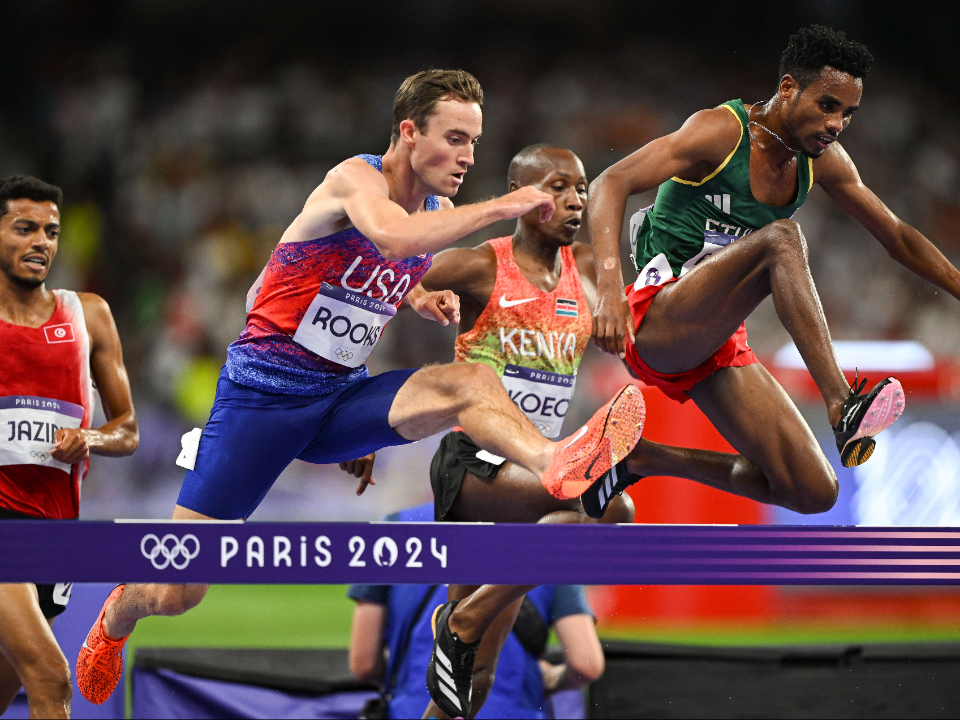
rooks-silver-alma-26-3.jpg
Kenneth Rooks, of the United States, clears an obstacle during the men's 3,000-meters steeplechase final, at the 2024 Summer Olympics, Wednesday, August 7, 2024, in Saint-Denis, France. Photo By David Fitzgerald/Sportsfile via Getty Images.All rights reserved.African runners have dominated the steeplechase for years, winning the gold medal in each of the previous 10 Olympic Games and 22 of 30 medals. The U.S. had won just two medals during that time, a silver in 2016 and a bronze in 1984.
Rooks is only the seventh American track and field athlete to win a medal in the Olympic men’s 3,000-meter steeplechase. He is also only the third American to win silver and just the second American since 1984 to medal in the event. Former BYU runner Brian Diemer won the bronze medal in the steeplechase in the 1984 Los Angeles Olympics. He was followed closely by fellow Cougar Henry Marsh, who finished in fourth place.
Rooks’ run ranks among the greatest Olympic performances ever by a current or former BYU track and field athlete. Alma Richards won the gold medal in the high jump in the 1912 Games. Frank Fredericks won silver medals in the 100- and 200-meter dashes in both the 1992 and 1996 Olympics. Ralph Mann won the silver medal in the 400-meter hurdles in the 1972 Olympics.
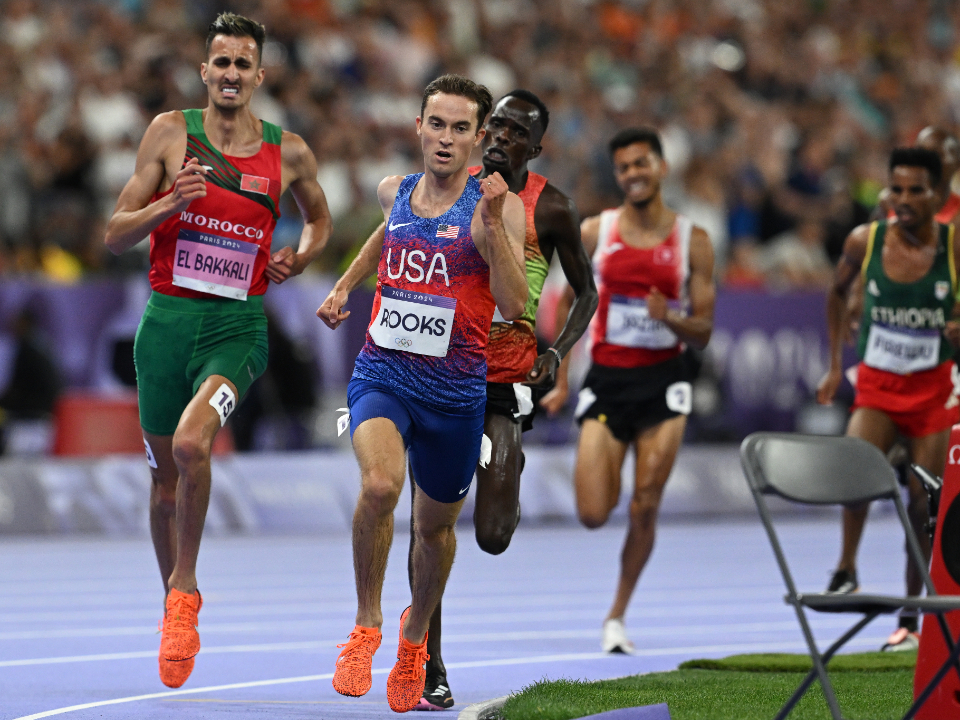
rooks-silver-alma-26-4.jpg
Soufiane El Bakkali, of Morocco, left, and Kenneth Rooks, of the United States, center, compete in the men's 3000-meters steeplechase final at the 2024 Summer Olympics, Wednesday, August 7, 2024, in Saint-Denis, France. Photo by Sven Hoppe/picture alliance via Getty Images.All rights reserved.Winning the silver medal at the Olympics caps off a thrilling couple of years for Rooks. As a sophomore at BYU, he finished sixth in the NCAA championships; a year later he won the 2023 NCAA championships and two weeks later won the U.S. championship after falling more than two laps into the race. That win qualified him to run in the 2023 world championships in Budapest, where he placed 10th — his first and only international competition before the Paris Olympic Games.
Prolonged Victory Lap
After winning the silver medal, Rooks found an American flag and took a prolonged victory lap, celebrating with family and friends and granting tons of photo requests.
He appreciated seeing people he knew as well as meeting strangers from other countries. He did his best to soak it all in.
“It was the type of moment where you think, ‘Wow, this is actually happening. Am I actually running a victory lap at the Olympics right now?’” he said.
After leaving the track, he submitted to routine post-race drug testing and spoke to news media. When he glanced at his cellphone there were more than 120 congratulatory messages waiting.
It was around 1 a.m. in France when Rooks and his wife joined others for “celebratory pizza” at a local restaurant. He finally went to bed around 3:30 a.m., but didn’t sleep long before getting up a few hours later for more media interviews. He received his silver medal later that day in a medal ceremony.
Additional Inspiration
Prior to competing in his event, Rooks said he also drew inspiration from spiritual messages shared by his fellow Latter-day Saint Olympians at a devotional on Sunday, August 4.
He especially appreciated a thought shared by Conner Mantz, who is competing for the U.S. in men’s marathon. Mantz said he is often recognized for his athletic accomplishments, but his true identity is “child of God” and “disciple of Jesus Christ.”
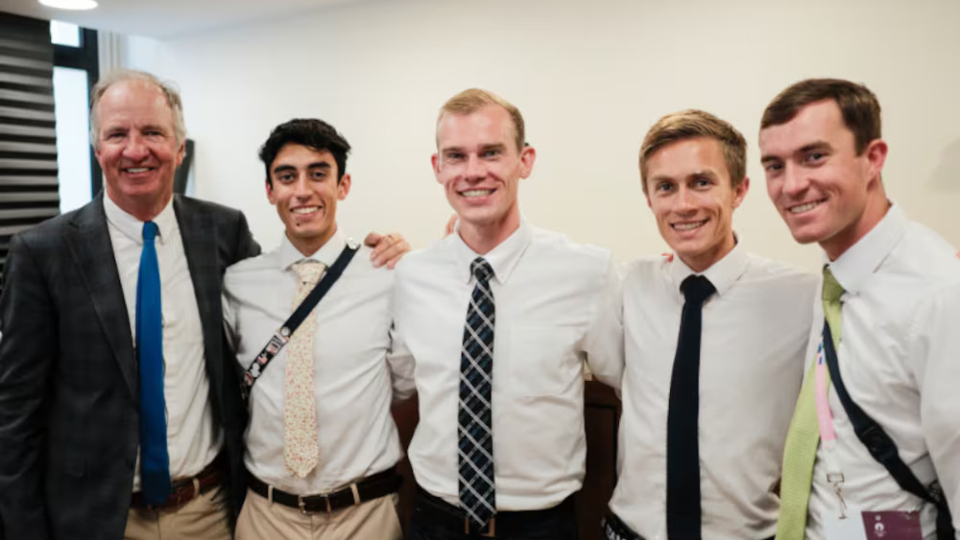
rooks-silver-alma-26-5.jpg
Left, BYU track and field coach Ed Eyestone, left, is pictured with Olympians James Corrigan, Clayton Young, Conner Mantz and Kenneth Rooks after the athletes spoke in a devotional for Latter-day Saints in France on August 4, 2024. Photo provided by BYU Photo, courtesy of Church News.All rights reserved.“Yes, I’m an Olympic silver medalist, and that is cool, but that is not the title or identity that is most important to me,” Rooks said. “I appreciated his thoughts on that.”
Once again reflecting on Alma 26, Rooks added, “I was thinking about being an instrument in the hands of God, and how being here at the Olympics is an opportunity for me to do that.”
Rooks served a full-time mission in Uganda and Orem, Utah, for The Church of Jesus Christ of Latter-day Saints.
Future Plans
Before returning to the United States later this month, Rooks will travel to Poland to compete in his first professional track league event.
“Most Diamond League meets are overseas, so I’m taking the opportunity while I am here,” Rooks said. “It’s new territory for me.”
Copyright 2024 Deseret News Publishing Company.

